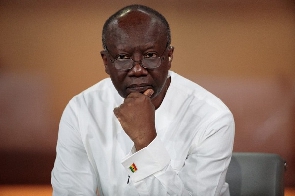 Finance Minister, Ken Ofori-Atta
Finance Minister, Ken Ofori-Atta
In early January, Chinese authorities identified the novel coronavirus, now formally known as COVID-19. Less than three months later, the virus became a global pandemic. Ghana recorded its first case in March and since then have recorded 200 more cases with 5 deaths. At the moment, Ghana and countries across the world are feeling the effects of nationwide lockdowns and economic uncertainty brought about by the pandemic. The shutdowns have resulted in a massive surge in joblessness globally. In Ghana, many economic activities both in the formal and informal sectors have come to an abrupt standstill.
As the government is working with health authorities to contain the spread of COVID-19, the government is also doing anything possible to keep the economy afloat. On March 27 2020, President Akufo-Addo announced a GHC1bn stimulus package. The Finance Minister appeared before parliament on March 30, 2020, to seek the approval to spend the GHC1bn under a Coronavirus Alleviation Program (CAP). The goal of the program is to cushion the disruption in economic activities on Ghanaians as the government tightens measures to flatten the spread of the deadly coronavirus.
In the rest of this article, I explain why the 1 billion Ghana cedis stimulus package is insufficient and may be inconsequential to keeping the economy afloat during these difficult uncertain times. Ghana’s economy does about GHC64 billion every quarter or three months.
This translates into GHC64 billion worth of output and GHC64 billion worth of income. With the slowdown in economic activities due to lockdowns and other health emergency measures, Ghana’s economy could contract by about 60%, which means that incomes in Ghana will decline roughly about 60% too. The 60% contraction in GDP amounts to GHC38.4 billion loss in income to Ghanaians on quarterly basis and GHC153.6 billion on annual basis.
Of these two estimates, the most relevant is the quarterly loss in income not the annual because of optimism that in the next three to five months the worst of the COVID-19 pandemic will be over. Obviously, we cannot expect the government to make up all the quarterly loss in income of 38.4 billion Ghana cedis. But the 1 billion Ghana cedis recently announced by the government is grossly inadequate, especially when Ghana has no functional unemployment insurance program.
Undeniably, the government has done and continues to do a marvellous job in mitigating this national health crisis placed upon us by the COVID-19 pandemic. I encourage the government to do even more to tame the spread of this deadly virus. I also encourage the government to consider the plight of Ghanaians whose daily lives have been awkwardly disrupted and their economic sources of survival have almost disappeared in the last three months.
The current stimulus package of 1 billion Ghana cedis (0.39% of GDP) is insufficient. The government should increase the package to about 12.8 billion Ghana cedis (5% of GDP). Some of this additional stimulus can go into the COVID-19 National Trust Fund, boost the production of personal protective equipment (PPE), and absorb the cost of electricity and water bills for households. A portion of the additional stimulus can also be injected into small, medium, and large-scale businesses to enable them keep workers on their payroll and minimize the extent of joblessness.
On balance, the additional financial support from the government will not only help the economy and Ghanaians stay afloat in these difficult uncertain times, but will also serve as a spark for stimulative growth when the economy rebounds.
The sole cause of the economic and social disruptions in the lives of Ghanaians is the pandemic and the sole solution to the disruptions will be the containment the pandemic. Consequently, all Ghanaians must also do their part to assist in flattening the infection curve of this pandemic and possibly end it soon.